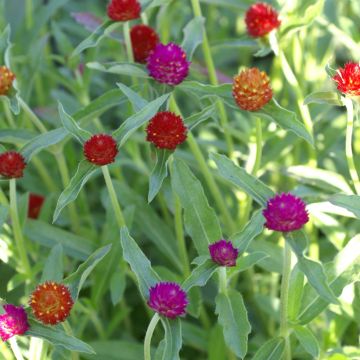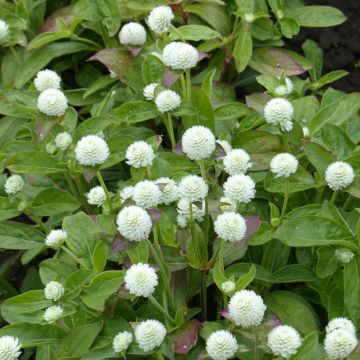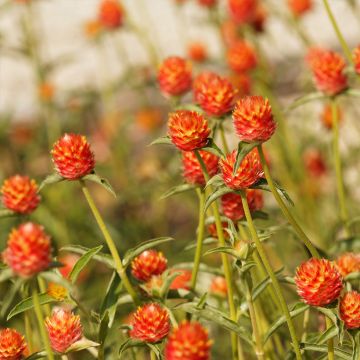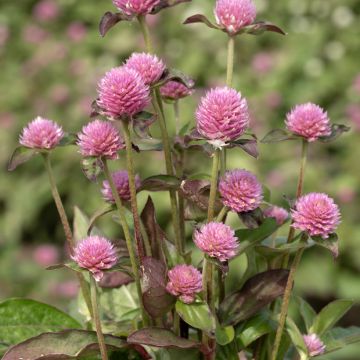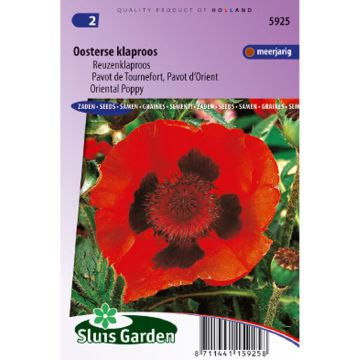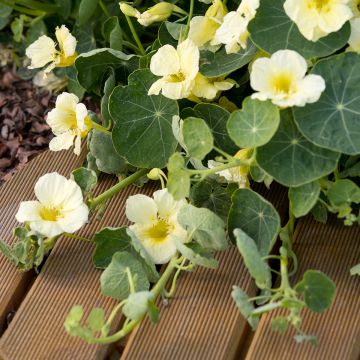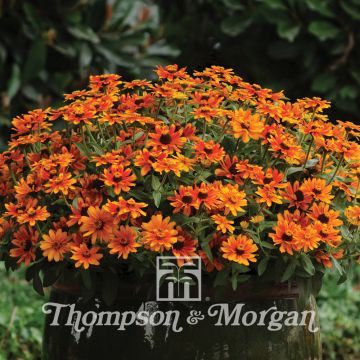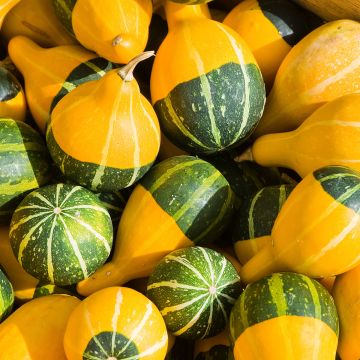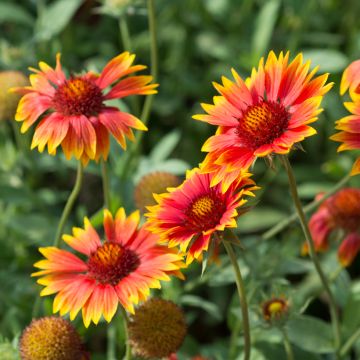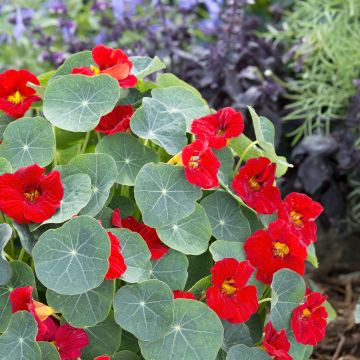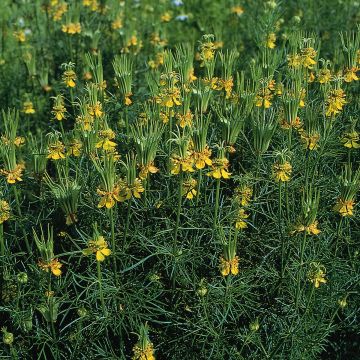Shipping country and language
Your country of residence may be:
Your country of residence is:
For a better user experience on our website, you can select:
Your shipping country:
-
Andorra
-
Austria
-
Belgium
-
Bulgaria
-
Canada
-
Chile
-
Croatia
-
Cyprus
-
Czechia
-
Denmark
-
Estonia
-
Finland
-
France
-
Germany
-
Greece
-
Hungary
-
Iceland
-
Ireland
-
Italy
-
Latvia
-
Lithuania
-
Luxembourg
-
Malta
-
Monaco
-
Netherlands
-
Poland
-
Portugal
-
Romania
-
Slovakia
-
Slovenia
-
Spain
-
Sweden
-
Switzerland
-
United Kingdom
We only deliver seed and bulb products to your country. If you add other products to your basket, they cannot be shipped.
Language:
-
French
-
German
-
Spanish
-
English
-
Italian
My Account
Hello
My wish lists
Log in / Register
Existing customer?
New customer?
Create an account to track your orders, access our customer service and, if you wish, make the most of our upcoming offers.
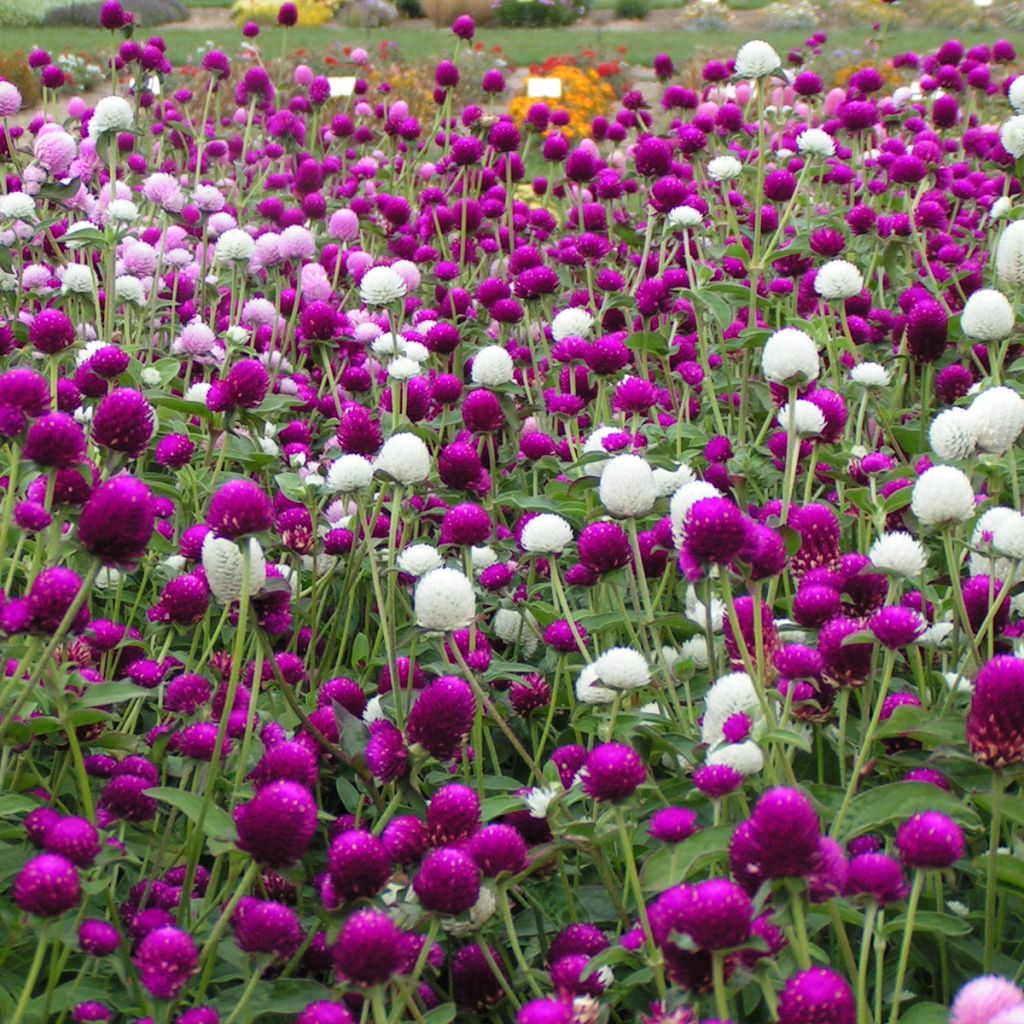

Graines d'Amarantine globuleuse QIS Formula Mix - Gomphrena globosa
Gomphrena globosa Qis Formula Mix - Globe Amaranth
Gomphrena globosa Qis Formula Mix
Globe Amaranth, Bachelor's Buttons
Seeded in buckets under shelter before being planted in a flower bed in full sun and rather dry conditions. Very long, colorful and flashy flowering. The colors were slightly different from the website photo (some plants produced orange-red flowers, not white).
Jean-Christophe, 26/04/2024
Order in the next for dispatch today!
Dispatch by letter from €3.90.
Delivery charge from €5.90 Oversize package delivery charge from €6.90.
More information
This item is not available in your country.
Schedule delivery date,
and select date in basket
This plant carries a 6 months recovery warranty
More information
We guarantee the quality of our plants for a full growing cycle, and will replace at our expense any plant that fails to recover under normal climatic and planting conditions.
Seed-only orders are dispatched by sealed envelope. The delivery charge for seed-only orders is €3.90.
Does this plant fit my garden?
Set up your Plantfit profile →
Description
The QIS Formula Mix Globe Amaranth, also known as Gomphrena globosa, is an excellent annual flower for fresh or dried bouquets. In a mix of colours, it offers small pompom-like flowers, globular in shape, measuring 2cm (1in) in shades of purple, pink, and white. The QIS or Quality In Seed series is the best choice for cut flower production due to the quality, length, and uniformity of the stems. This lovely annual flowering plant allows for the creation of bouquets from July to September and extends the season when dried.
This Globe Amaranth is best suited for border planting. Given its habit, its effect will be more pronounced when planted in groups. Each plant has multiple upright stems, each topped with a single globular flower. Additionally, the lanceolate and elongated leaves are rather small (5cm (2in)) and attached near the stem (referred to as sessile). Therefore, the overall effect will be provided by multiple plants. The plant can reach a height of 50cm (20in) when in bloom. Its various colours, in purple, pink, and white, complemented by a slightly bluish-green foliage with a hint of grey, naturally fit into an ensemble of similar colours, but also brighten up a more neutral background. The Globe Amaranth, native to Central America, prefers a sunny exposure.
Like some of its relatives in the Amaranthaceae family, it can be used in dried compositions. In fact, Amaranthus means in Greek: "that which does not wither". To keep them looking their best, don't hesitate to cut them as soon as the flowers appear, as this will help them retain their shape and colours.
Report an error about the product description
Flowering
Foliage
Plant habit
Botanical data
Gomphrena
globosa
Qis Formula Mix
Amaranthaceae
Globe Amaranth, Bachelor's Buttons
Cultivar or hybrid
Other Graines de Gomphrena - Amarantine
Planting and care
Amaranths should preferably be sown indoors in a seed tray from March onwards. Just cover the seeds with a thin layer of substrate that you will keep slightly moist. When the seedlings are large enough to be moved, you can separate them and put them in buckets if the frost period is not over yet and keep them warm. Otherwise, you can plant them directly in the ground, spacing them 30cm (12in) apart. Watering will only be necessary in case of drought during the first few weeks after planting.
Sowing period
Intended location
-
, onOrder confirmed
Reply from on Promesse de fleurs
Flower seeds
Haven't found what you were looking for?
Hardiness is the lowest winter temperature a plant can endure without suffering serious damage or even dying. However, hardiness is affected by location (a sheltered area, such as a patio), protection (winter cover) and soil type (hardiness is improved by well-drained soil).

Photo Sharing Terms & Conditions
In order to encourage gardeners to interact and share their experiences, Promesse de fleurs offers various media enabling content to be uploaded onto its Site - in particular via the ‘Photo sharing’ module.
The User agrees to refrain from:
- Posting any content that is illegal, prejudicial, insulting, racist, inciteful to hatred, revisionist, contrary to public decency, that infringes on privacy or on the privacy rights of third parties, in particular the publicity rights of persons and goods, intellectual property rights, or the right to privacy.
- Submitting content on behalf of a third party;
- Impersonate the identity of a third party and/or publish any personal information about a third party;
In general, the User undertakes to refrain from any unethical behaviour.
All Content (in particular text, comments, files, images, photos, videos, creative works, etc.), which may be subject to property or intellectual property rights, image or other private rights, shall remain the property of the User, subject to the limited rights granted by the terms of the licence granted by Promesse de fleurs as stated below. Users are at liberty to publish or not to publish such Content on the Site, notably via the ‘Photo Sharing’ facility, and accept that this Content shall be made public and freely accessible, notably on the Internet.
Users further acknowledge, undertake to have ,and guarantee that they hold all necessary rights and permissions to publish such material on the Site, in particular with regard to the legislation in force pertaining to any privacy, property, intellectual property, image, or contractual rights, or rights of any other nature. By publishing such Content on the Site, Users acknowledge accepting full liability as publishers of the Content within the meaning of the law, and grant Promesse de fleurs, free of charge, an inclusive, worldwide licence for the said Content for the entire duration of its publication, including all reproduction, representation, up/downloading, displaying, performing, transmission, and storage rights.
Users also grant permission for their name to be linked to the Content and accept that this link may not always be made available.
By engaging in posting material, Users consent to their Content becoming automatically accessible on the Internet, in particular on other sites and/or blogs and/or web pages of the Promesse de fleurs site, including in particular social pages and the Promesse de fleurs catalogue.
Users may secure the removal of entrusted content free of charge by issuing a simple request via our contact form.
The flowering period indicated on our website applies to countries and regions located in USDA zone 8 (France, the United Kingdom, Ireland, the Netherlands, etc.)
It will vary according to where you live:
- In zones 9 to 10 (Italy, Spain, Greece, etc.), flowering will occur about 2 to 4 weeks earlier.
- In zones 6 to 7 (Germany, Poland, Slovenia, and lower mountainous regions), flowering will be delayed by 2 to 3 weeks.
- In zone 5 (Central Europe, Scandinavia), blooming will be delayed by 3 to 5 weeks.
In temperate climates, pruning of spring-flowering shrubs (forsythia, spireas, etc.) should be done just after flowering.
Pruning of summer-flowering shrubs (Indian Lilac, Perovskia, etc.) can be done in winter or spring.
In cold regions as well as with frost-sensitive plants, avoid pruning too early when severe frosts may still occur.
The planting period indicated on our website applies to countries and regions located in USDA zone 8 (France, United Kingdom, Ireland, Netherlands).
It will vary according to where you live:
- In Mediterranean zones (Marseille, Madrid, Milan, etc.), autumn and winter are the best planting periods.
- In continental zones (Strasbourg, Munich, Vienna, etc.), delay planting by 2 to 3 weeks in spring and bring it forward by 2 to 4 weeks in autumn.
- In mountainous regions (the Alps, Pyrenees, Carpathians, etc.), it is best to plant in late spring (May-June) or late summer (August-September).
The harvesting period indicated on our website applies to countries and regions in USDA zone 8 (France, England, Ireland, the Netherlands).
In colder areas (Scandinavia, Poland, Austria...) fruit and vegetable harvests are likely to be delayed by 3-4 weeks.
In warmer areas (Italy, Spain, Greece, etc.), harvesting will probably take place earlier, depending on weather conditions.
The sowing periods indicated on our website apply to countries and regions within USDA Zone 8 (France, UK, Ireland, Netherlands).
In colder areas (Scandinavia, Poland, Austria...), delay any outdoor sowing by 3-4 weeks, or sow under glass.
In warmer climes (Italy, Spain, Greece, etc.), bring outdoor sowing forward by a few weeks.
